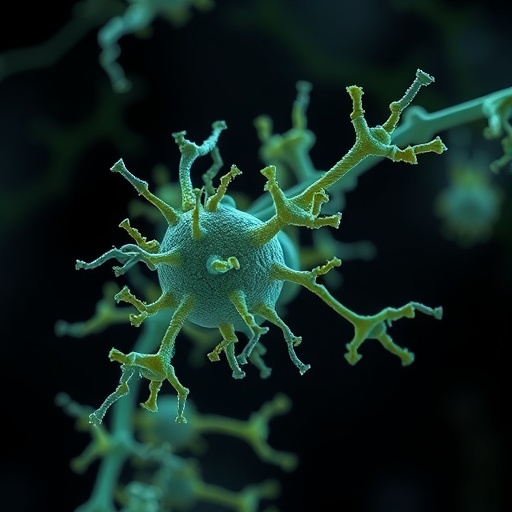
In a groundbreaking study emerging from the depths of the Brazilian Amazon, scientists have unveiled molecular evidence pointing to the presence of a previously unidentified species of the genus Bartonella harbored within sand flies, or phlebotomine insects. These insects are traditionally fingered as vectors for leishmaniasis, a disease with significant medical impact in tropical regions. Yet, this discovery reveals a novel biological narrative where Bartonella bacteria, notorious for causing various systemic infections, may have established an unrecognized foothold in the neotropical ecosystem, potentially altering the known epidemiological landscape of vector-borne diseases in South America.
The genus Bartonella encompasses a group of gram-negative bacteria, several species of which are infamous for initiating persistent infections in humans and other mammals. Among them, Bartonella bacilliformis and Bartonella ancashensis hold clinical prominence as etiologic agents of Carrión’s disease, a severe illness endemic to Andean valleys and transmitted by phlebotomine sand flies. The newly detected bacterium in the Amazon demonstrates close genetic kinship to these Andean pathogens, suggesting evolutionary and ecological parallels that challenge long-held assumptions regarding pathogen distribution and vector compatibility in this biodiverse region.
The study’s methodology involved meticulous DNA analysis of 297 female phlebotomine sand fly specimens collected over a one-year period within the Amazon National Park situated in Pará state of Brazil. Collections were strategically carried out monthly along riverbank trails adjacent to the Uruá and Tracoá rivers, areas characterized by abundant biodiversity and human visitation. This approach not only enabled a comprehensive sampling of vector populations but also provided a window into the dynamics of microbial colonization within vector hosts in this vast rainforest biome.
The molecular screening revealed DNA sequences affiliated with Bartonella spp. that, while distinct from those documented in Peru, exhibit remarkable similarity to the Carrión’s disease-causing bacteria. This finding insinuates the possibility of these pathogenic bacteria or their close relatives adapting to novel sand fly species endemic to Brazil, such as Pintomyia serrana and Pintomyia nevesi, which are morphologically and genetically related to the known vectors Pintomyia robusta and Pintomyia maranonensis in Peru. Such an adaptation could represent a critical expansion of the geographic and entomological range for Bartonella transmission.
Although the consequences of harboring this newly discovered Bartonella species within Brazilian sand flies remain undetermined in terms of human or animal pathogenicity, the implications bear weight on public health surveillance and tropical medicine. Historically, Bartonella species are implicated in a diversity of clinical syndromes collectively termed bartonellosis, which includes diseases ranging from cat scratch disease to more severe febrile illnesses. The tendency of these bacteria to persist undetected within host organisms, especially individuals with compromised immune systems, underscores their stealthy pathogenic potential.
Experts stress the urgency of expanding investigative efforts, aiming to characterize the biological role of this bacterium within Amazonian sand flies and to ascertain its capacity for infection and disease causation in humans or reservoir animals. Understanding its vector-host interplay and reservoir dynamics is paramount for delineating its epidemiological significance. In this context, the research team anticipates that future studies will include feeding behavior analyses of sand flies to identify potential mammalian hosts that sustain the bacterium’s life cycle within the rainforest ecosystem.
This discovery emerges amidst a broader scientific initiative led by researchers from São Paulo State University and the University of São Paulo, with funding from the São Paulo Research Foundation (FAPESP). The collaborative efforts traverse various Amazonian states aiming to map the prevalence of Bartonella and related vector-borne pathogens. The data accrued not only push the boundaries of microbiological and entomological knowledge but also address the neglected status of bartonellosis, particularly in regions marked by limited healthcare access and socioeconomic vulnerability.
The study’s authors advocate for heightened clinical awareness and diagnostic vigilance amongst healthcare providers in tropical and subtropical areas, especially when confronted with patients exhibiting fever of unknown origin or chronic febrile conditions. The possibility of co-infection with Leishmania parasites and Bartonella spp., given their shared vector, raises complex challenges for diagnosis and treatment in endemic zones. It is proposed that integrating molecular diagnostic techniques in these settings could unearth previously overlooked infections, enabling tailored public health interventions.
The publication of this research in the peer-reviewed journal Acta Tropica underscores its scientific rigor and importance. Its dissemination opens avenues for international collaboration focused on combating vector-borne diseases stemming from complex bacterial vectors in rainforest environments. The findings, while preliminary, act as a clarion call to the scientific community, emphasizing the intricate interrelations among vectors, bacterial pathogens, and diverse ecosystems that continue to harbor undiscovered microbial agents of potential medical relevance.
In conclusion, this novel identification of a Bartonella species in Amazonian sand flies not only enriches our comprehension of bacterial diversity within tropical vectors but also highlights the vital need for comprehensive vectored disease surveillance in understudied biomes. Forthcoming multidisciplinary research endeavors will be critical to unravel the pathogenic potential and ecological dynamics of this bacterium, whose presence may redefine the paradigms of infectious disease emergence in South America’s vast wilderness.
Subject of Research: Molecular detection of Bartonella species in phlebotomine sand flies from the Brazilian Amazon and their potential epidemiological implications.
Article Title: Molecular evidence of Bartonella spp. in sand flies (Diptera: Psychodidae) from the Brazilian Amazon
News Publication Date: 29-May-2025
Web References:
Article DOI
Researcher Marcos Rogério André
Researcher Eunice Aparecida Bianchi Galati
FAPESP Funding Project 22/08543-2
FAPESP Funding Project 22/16085-4
FAPESP Funding Project 113060
References: Published in Acta Tropica, DOI: 10.1016/j.actatropica.2025.107682
Keywords: Tropical diseases, Epidemiology, Bartonella, Bacteria, Phlebotomine sand flies, Amazon rainforest, Vector-borne infections, Carrión’s disease, Leishmaniasis, Molecular diagnostics
Tags: Amazonian bacterium discoveryBartonella genus researchCarrión’s disease and Andean valleysecological impact of bacteria in ecosystemsepidemiological landscape changesgenetic kinship in bacteriahuman Bartonellosis pathogensmolecular evidence of new speciesnovel bacterial infections in humansphlebotomine sand flies as vectorstropical disease researchvector-borne diseases in South America





